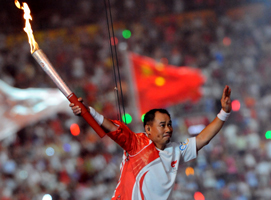The intellectual property (IP) system, and trademarks in particular, play a pivotal role in safeguarding the unique character of the Olympic Games and their identifications, including the Olympic symbol, Olympic emblems, the flag, the torch and the anthem. The Olympic Games are the largest and most complex sporting event in the world. The Games are as much a celebration of innovation and creativity as they are of humanity, fair play and sporting excellence.

The designs of olympic torches are typically protected by
design registration. (Photo: Tim Hipps)
The Olympic symbol is also protected by the Nairobi Treaty on the Protection of the Olympic Symbol – one of the international treaties on IP administered by WIPO. Any state that has signed up to this treaty is obliged “to refuse or to invalidate the registration as a mark and to prohibit by appropriate measures the use, as a mark or other sign, for commercial purposes, of any sign consisting of or containing the Olympic symbol, as defined in the Charter of the International Olympic Committee, except with the authorization of the International Olympic Committee.”
By protecting its IP, the Olympic Movement is able to leverage its reputation and attract commercial partners. Revenue generated by the International Olympic Committee (IOC) from corporate sponsorship, from the sale of broadcasting rights, and from licensing not only provides valuable resources for funding the Games, it also contributes to the development of sport and promotes broader humanitarian goals in all corners of the world.
The Olympic Licensing Programmes
The Olympic Licensing Programmes produce officially licensed products from the organizing committees for the Olympic Games, the National Olympic Committees and the IOC. These commemorative products bear the emblems and mascots of the Olympic Games or Olympic teams. By maintaining high merchandising standards, they act as creative and pro-active custodians of the Olympic brand, enhancing the Olympic image and ensuring quality goods for the public.
Private sector partners and sponsors play a pivotal role in the Games. They provide the latest technology and expertise to help stage the world’s largest and most complex sporting event. Olympic sponsorship entitles companies to different marketing rights in various regions, category exclusivity and the use of designated Olympic images and marks.
Use of digital media
The IOC has embraced the use of digital platforms, including social media, to interact with and engage audiences, especially young people. At the same time, it has put in place a series of measures to protect its own IP rights and those of rights-holding broadcasters, from online piracy. One measure has been simply to offer abundant and freely available, high quality content across platforms around the world, reducing the incentive to access pirated clips.
However, the IOC also uses advanced anti-piracy technology to prevent, track and take action against the upload of unauthorized Olympic content, in cooperation with major video-sharing websites and the relevant authorities in Games host countries. These measures have substantially reduced piracy of footage from the Games in recent years.
WIPO Magazine articles
- Protecting the Olympic Properties (WIPO Magazine 4/2016)
- The Olympic Properties (WIPO Magazine 3/2012)